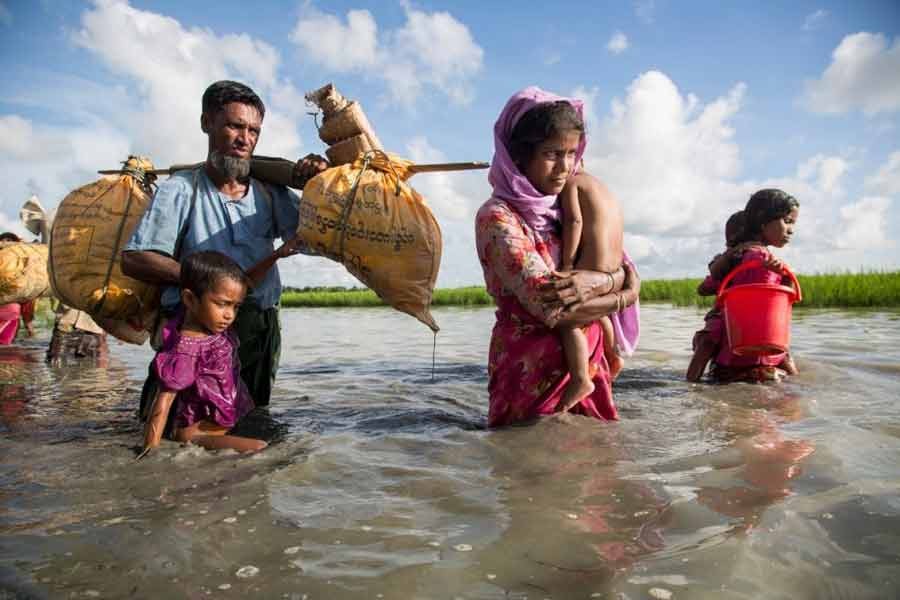
Published :
Updated :

Love it or loathe it, the heinous migration cycle has begun to emerge from the ashes of the pandemic. In a convoluted way, those in Europe that had spat bitterly on such activity aren't as vocal. With swathes of populations having been swept from the face of the earth, the ageing European countries are facing even bigger labour shortages than before. Dwindling birth rates and increased longevity comes at a price. The United Kingdom may have exulted after achieving Brexit; not as much now. A sudden shortage of lorry-drivers, that had mostly been sourced from lesser well to do EU nations, has caused petrol stations to dry-up and businesses warning that come Christmas, their product deliveries could fall short. Prime Minister Boris Johnson has called for not going into panic-buying and called up army drivers to fill the void in the short term.
Fighting for survival, the Emmanuel Macron government has given in to nationalistic sentiments by closing down a second refugee camp. Where the inmates will go hasn't been made public yet. The unscrupulous agents that abet illegal migration haven't been identified or taken action against. Emerging from slumber, with economies swirling out of control, they are willing to take the risk at a price. The humanitarian causes of migration continue to be ignored even as the salve applied by refugee care agencies run short. Bangladesh has gone from pillar to post for a resolution to the Rohingya refugee crisis. From spending close to $400 million in preparing a habitable and safe camp at Bhasanchar to continuing to fund for homes and livelihoods, the country has done its part. The international community has all but turned a blind eye and the Prime Minister Sheikh Hasina was compelled to remind the world that it is Myanmar that created the issue and are is responsible for its resolution. No one seems to be listening, least of all Nyapidaw.
Economics, unrelenting as always has prevailed. A mix of illegal drug peddling, cross-border cash dealings just as illegal simple trading has created not just an economy in the camps but, worse still, political division. A couple of years ago, the Cox' Bazar district administration was castigated for having allowed a political meeting to take place led by the emergent Rohingya leader Muhibullah. His gunning down a few days ago exemplifies the divide among the camp inmates. Worse, it exposes the ease with which security of the camps can be breached. That this would be the case was just a matter of time.
Economies grow out of need. Unsavoury elements remain poised to fund such economies. The impact is as unrestricted in the lop-sided battle between drug-peddlers and arms trade. Just how big that economy is hasn't been documented but when the reach is some one million people, it can't be small either. Pushing migrants aware isn't the answer unless brutal offensives are launched. The peace advocates won't let that happen. Governments are left to come up with their own solutions especially where human rights are concerned. Basic housing, living standards and the finer aspects of education and even livelihoods have to be factored in. Bhasanchar offered all of this, though the supply chain aspect of agriculture and fisheries wasn't clearly defined. How and where the outputs would be distributed hasn't been made clear either.
Incredible as it may sound, migrants for all their penniless pockets have found the money to pay the brokers that promise them a way out of the confines of camps to seemingly better futures. That which Europe had been apprehensive about has been amply demonstrated by the goings-on in the Rohingya camps. They are grouping together under broad platforms and without doubt, spurred on by the intelligence agencies on both sides of the border. Muhibullah's death adds to the list of 130 reported in the media in the past four years. The headache that it brings with it is revenge and vengeance waiting to be ignited by more funds and upscaling of the drug and arms dealer operations. The migrants are given one-way tickets by the brokers. Turning the tide is nigh impossible for Europe. Bangladesh will have to hope that some sense prevails, either soon or when the junta in Myanmar goes for elections of a kind. Till then, the burden remains in her court. Till then, the growing risk of integration in local society will continue to haunt. Economics will have its say.
mahmudrahman@gmail.com


 For all latest news, follow The Financial Express Google News channel.
For all latest news, follow The Financial Express Google News channel.